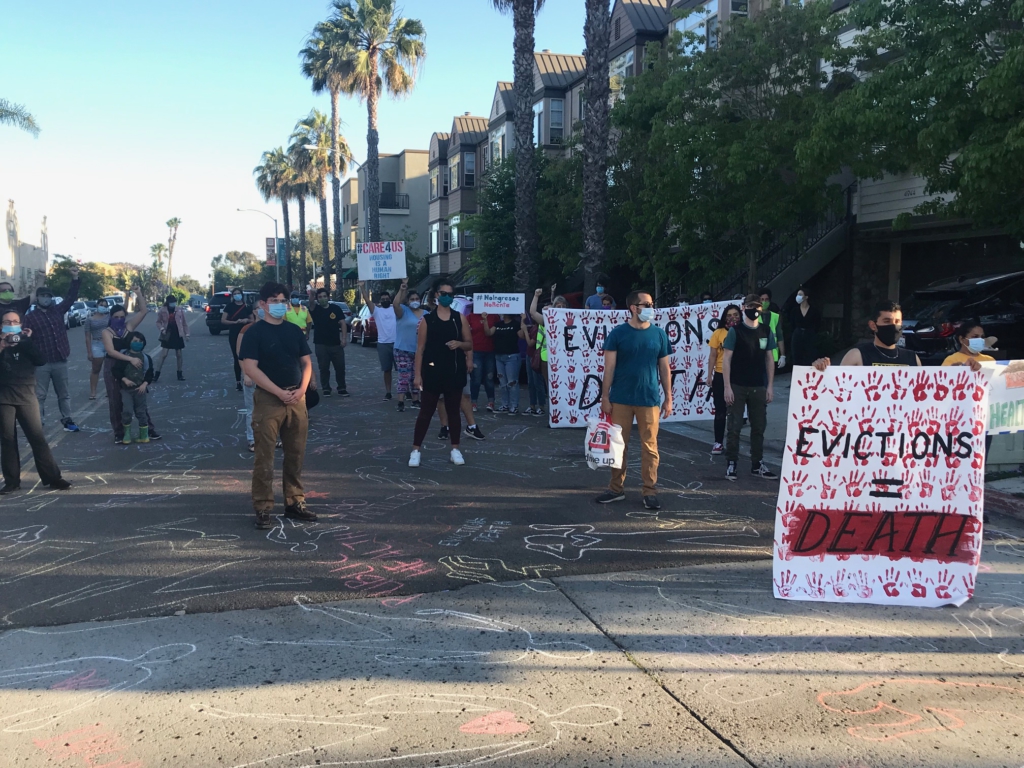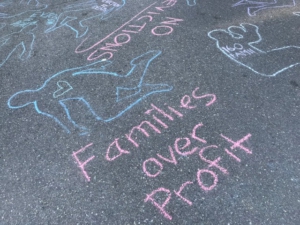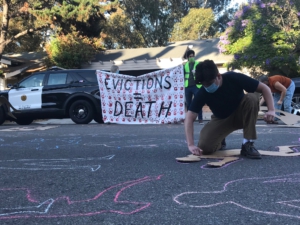
On May 26, dozens of organizers and activists from the Alliance of Californians for Community Empowerment, San Diego Tenants Union, Party for Socialism and Liberation, Democratic Socialists of America, and other organizations protested in front of a condo in the gentrified neighborhood of Hillcrest in San Diego.
Wearing personal protective equipment, participants covered sidewalks and streets with chalk outlines of human figures and political messages such as “Evictions = Death” and “Cancel the Rents.” Neighbors watched curiously from their front porches and windows. The target of the artistic protest and owner of the condo was San Diego Sheriff Bill Gore. On May 11, Gore announced that he would resume evictions on May 27 despite the COVID-19 crisis.

In San Diego, average rent for a two-bedroom apartment runs between $1,800 and $2,400 a month. Due to massive job losses related to COVID-19, many people are unable to pay. There were 20 million new unemployment claims filed nationwide in April alone.
“I’m a single mom, I’ve always worked hard for my kids, always worked hard to pay my rent on time and to put food on the table,” said Patricia Mendoza. She was a participant in the action who is potentially facing eviction. “Because of this pandemic, I’m out of a job. I haven’t worked since March. I’d rather feed my kids than pay rent, because I can’t afford to do both.”
In their statement, the San Diego Sheriff’s department claimed that deputies would not be serving eviction orders to anyone who has lost income due to COVID-19. Those tenants are protected by the emergency measures instituted by the county and city.
Nevertheless, at least 160 evictions already planned before the pandemic will now be enforced. Many public officials are criticizing the move. It could push more people into homelessness in the midst of a pandemic and economic depression.
Even the patchwork of protections passed by county and city officials is proving inadequate for workers and poor families. Temporary eviction moratoriums require that tenants eventually pay back the thousands of dollars in rent that accrues. Patricia explained: “Moratoriums aren’t enough. My regular income was like $2,000 a month, and I already pay 75 percent of my income in rent. I was left with like $500 to feed my kids, to pay SDG&E, the Internet, my phone. It’s impossible to pay back thousands of dollars on top of that.”

Human cost of evictions
The 160 chalk outlines drawn by participants represent the human cost of the potential evictions. People like Patricia and her family could be forced to live in their cars or on the streets. “There needs to be help for us, there are a lot of people out there in my position,” Patricia told Liberation News.
The Party for Socialism and Liberation is mobilizing in more than 60 cities around the country to demand government officials cancel the rents on Saturday, May 30. You can find a protest near you and sign the petition calling for rent and mortgage payment cancellation with no debt accrual for residents and small businesses at www.CancelTheRents.org.





